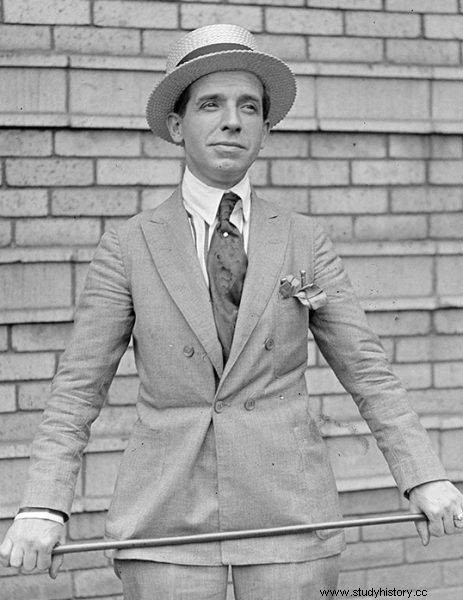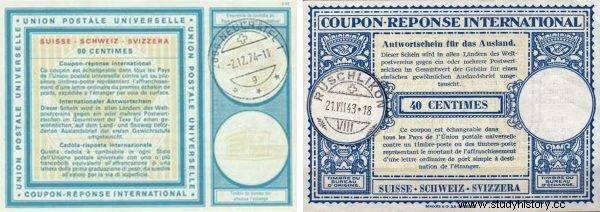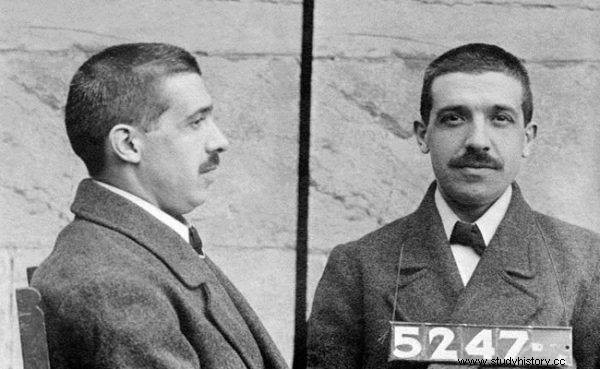The Ponzi scheme is currently one of the most famous scams in history. The vicissitudes of his life, Charles Ponzi, to whom this great deception owes its name, is a sad tale of a man unable to tell himself enough. He paid a high price for it.
Charles Ponzi was born on March 3, 1882 in the Italian Lugo as Carlo Pietro Giovanni Guglielmo Tebaldo Ponzi. According to what he later related, his family came from a wealthy Parma lineage. Unfortunately, as a result of the turmoil in life, she lost her fortune. Nevertheless, his mother was still called "donna" as a memory of the heyday.
Charles himself was a person who loved money and how it was spent. But getting and keeping funds was a bigger problem for him.
He entered the University of Rome "La Sapienza" with good intentions, but it soon turned out that he was not one of the most persistent students. He spent the next 4 years playing with his wealthy friends in bars, restaurants and cafes of the capital, and ended the whole adventure without money or a diploma.
Seeing no further future for himself in Italy, he decided to follow the trend of the time and set off overseas, where a better life was to await him. On November 15, 1903, he arrived in Boston with just $ 2.50 in his pocket. He lost the rest of the money to cards during the trip.
In search of a better life
He tried to live in a new place for a while, working part-time in various places - as a cleaner or a waiter. He was a gifted man, as he managed to learn English quickly, unfortunately the love of scams was his undoing . He did not stay anywhere longer. He was thrown out for petty thefts or attempts to cheat customers. And after getting to know most of the places in this part of the East Coast about his slyness, Ponzi decided to move to Canada.
In 1907, he moved to Montreal, where he found a job as an assistant cashier at Banco Zarossi. The bank was created with Italian immigrants in mind, to whom it offered very high interest rates on deposits at that time.

Charles was a person who loved money and how it was spent. However, fundraising and keeping was a bigger problem for him.
Ponzi was doing great in his new workplace, both due to his personal charm and ease of socializing, and his knowledge of three languages - Italian, French and English. Unfortunately, it soon turned out that the owner of the bank, Luigi "Louis" Zarossi, was a trickster who wanted easy money at the expense of others. Bad investments and scams led to the collapse of Banco . Its owner ran away to Mexico with what he could, and Ponzi was left penniless again.
In order to save his situation, he decided to forge the check of one of Zarossi's former clients and thus ended up in prison for 3 years. He only told his family in Italy that the move to Vancouver was related to his new job as assistant warden of the prison.
After his release in 1911, he returned to the US, where collaborated in smuggling illegal Italian immigrants, for which he spent the next two years in Atlanta. After the sentence was over, Ponzi returned to Boston and briefly settled down, thanks to Rose Gnecco.
The couple got married in 1918 and Charles decided to try to live as a law-abiding citizen. He caught a variety of jobs - including commerce, marketing, translation, and nursing. Unfortunately, he always faced some obstacles that either prevented him or discouraged him from staying in a given position. However, in 1919, Ponzi got a small object that was to change his fate and the fate of tens of thousands of people who later trusted him.
Ponzi scheme
While trying his hand at marketing by letter, Charles came across an International Reply Coupon (IRC) in a mail from Spain, which was mainly used by mail order companies. It could be exchanged for a postage stamp for a regular foreign letter in any country of the Universal Postal Union (that is, almost anywhere in the world). Ponzi found a vulnerability in this system.
As a result of the price turmoil after World War I, the exchange of IRC for stamps in the USA could be quite profitable . Charles had the idea of buying European coupons in bulk, which he then exchanged for stamps in America and sold at a profit of up to 40%. It was a fully legal form of arbitration. All he needed to succeed was adequate capital.

Charles came across an International Reply Coupon (IRC) in a shipment from Spain, which was mainly used by mail order companies.
Therefore, he first went to the bank for a loan, but was refused. So he decided to look for investors who would help increase profits. Eventually, his gift of winning over people began to pay off.
Ponzi's success in raising capital lay in the way he talked to people. He was not an intrusive trader forcing his ideas to others . He wove information about his financial possibilities and his own success casually, in a casual way. It inspired more confidence from potential investors and made people themselves insist that he accept money from them. In this way, he obtained funds that supported one of the most famous scams in history.
Investment without risk?
Ponzi's business started to go so well that in January 1920, Charles founded the Securities Exchange Company. He promised his investors insane profits without risk of 50% after 45 days or 100% after 90 days . Thus, millions began to appear on his account. He was earning as much as $ 250,000 a day at its peak, which translated into a life of luxury.
He bought a 12-room mansion in Lexington, Massachusetts with air conditioning and a heated pool, drove a limousine with a chauffeur, wore expensive tailor-made suits, and a cane by a handyman. He also bought out the bank, which had refused him a loan earlier, and Poole's Brokerage Firm, from which he was previously released. He did this only so that he could personally hand over the dismissal to the manager who kicked him out.
Ponzi opened new branches in New England. Initially, mainly working-class immigrants invested in the scheme, but richer clients - including Boston Brahmins and local policemen - started to come along with the publicity. People mortgaged houses and handed over his lifetime savings to him. Ponzi's relatives have also invested their funds, including his chauffeur and his brother-in-law.
Unfortunately, this soap bubble couldn't last forever. The scheme raised more and more doubts in the financial world.
A painful fall
On July 24, 1920, an interview with Charles Ponzi was published in The Boston Post. The man told about the backstage of his success. Two days later, on Monday, crowds of people willing to invest in the Italian's plan gathered in front of the offices of the Securities Exchange Company. On that one day Ponzi raised $ 3 million (today 34 million).
Despite the fact that Charles's company was generating large profits every day, the simplest financial analysis showed that the operation must have been carried out with considerable losses. As long as the money flowed in, investors could be paid, but it had to stop sometime.

The main culprit was charged with 86 postal fraud and faced with a life sentence.
The same "The Boston Post," which publicized the success of the Ponzi scheme in New England in July 1920, contributed to its downfall. As a result of an investigation by the prosecutor's office on August 2, 1920, an article was released whose headline screamed Charles's total insolvency. The collapse of Ponzi took 6 banks with it and wiped out investors who consequently received less than 30 cents for every dollar invested.
The main culprit was charged with 86 postal frauds and was facing a life sentence. However, at the urging of his wife, he pleaded guilty. He got 5 years, of which he served 3.5. He did not enjoy his freedom, as he was almost immediately accused of theft again and was sentenced to 5 to 9 years, from which he was released on bail in 1925. This time, however, he also did not leave the prison for long.
He moved to Florida - and got caught up in another scam. It was the sale of building plots that were actually in a swampy area. When the case came to light, he tried to flee to Italy, but was spotted at the last minute and caught in a New Orleans port. He was given another 7 years, and after serving his sentence, he was deported to his homeland, ultimately leading to his divorce from Rose.
In Italy, he continued to try his luck in scams until he finally started working as an agent for Italian airlines in Brazil. He lost his job with the accession of this country to World War II on the side of the Allies.
Charles Ponzi spent the last years of his life in Rio de Janeiro as a teacher and translator. He wrote an autobiography. He survived a stroke that partially blinded him and paralyzed him. He died on January 18, 1949 in a charity hospital. He left a fortune that allowed only to cover the costs of a very modest burial.
